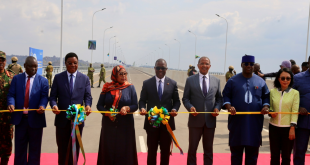
By Gerald Mbanda
African countries have rejected to join western countries that blame China on the alleged mistreatment of the Muslim Uyghur population in the north-western region of Xinjiang. They have also rejected to sign up to UN rebukes of China’s alleged human rights violations in Xinjiang, Hong Kong or Tibet.
Accusations against China of forced labour, forced sterilization, torture and genocide, in Xinjiang region are wild allegations that are far from the reality according to African diplomats. In March, several African ambassadors accredited to China met in Beijing for the 7th ambassador lecture under the theme “Xinjiang in the Eyes of Africa Ambassadors to China.” The African ambassadors observed that western countries are hyping Xinjiang issues intentionally to attack China’s internal affairs as well as undermining China’s development.
For years, China has put in place stringent anti- terrorism measure in Xinjiang to deal with terrorism, a challenge faced with several other countries around the world. However, western countries have long been known to assume to be the controllers and custodians of the global narrative, and the definers of terrorism, those involved and measures to fight terrorism. It is only when the acts of terrorism affect their own territory and people that they will accept that terrorism is real. When it happens to others, the fight against terrorism changes to abuse of human rights.
It is also a known fact that western countries have used human rights as a political tool to intimidate countries that are perceived as a threat to their interests. China and many African countries are usually threatened by reports produced by US human rights organizations like Human Rights Watch, Amnesty International and others, an act that is seen by almost all African countries as hypocritical. The invasion of Iraq in 2003 and the killing of the Saddam Hussein by US forces and their allies was the biggest lie by the west in modern times of fighting to protect human rights against weapons of mass destruction that never existed. Secondly, the war was in contravention of international norms with no approval by the United Nations Security Council.
Africans have not yet forgotten the brutality and untold human rights violations inflicted on the African people during slave trade and colonialism. Their resources were stolen in broad day light by the same people who turn around and claim to lecture the world about human rights. On the other hand, human rights abuses in countries like US of racial discrimination and rampant gun violence are not talked about by these human rights organizations because those affected are either blacks or people of colour. Such double standards approach is a shot in their own goal that leaves them with no moral authority to judge the world on human rights issues. Instead, they should be much more worried by what happens in their backyard than meddling in the affairs of other countries.
In the present day Democratic Republic of Congo (DRC) millions of people were killed while others were maimed during colonialism at the orders of King Leopold II of Belgium simply because they did not meet their quotas of producing raw materials for export to Belgium under forced labour. Belgium was largely built by natural resources looted from Congo and the price was the blood and sweat of the Congolese people.
China and Africa have a shared history of a bitter past caused by western injustices, but most important, today, they have a shared vision of prosperity for their people through various cooperation frameworks in social, political and economic fields. The bond of solidarity between China and Africa continues to grow day by day and this explains why African countries stand by China against the west on a number of issues including human rights. African diplomats who have visited Xinjiang testify what they saw of people living in full enjoyment of their rights and freedoms.
Gerald Mbanda is a Researcher and publisher on China and Africa.
For comments or opinion write to us on info@africachinareview.com
 Africa -China Review Africa -China Cooperation and Transformation
Africa -China Review Africa -China Cooperation and Transformation
